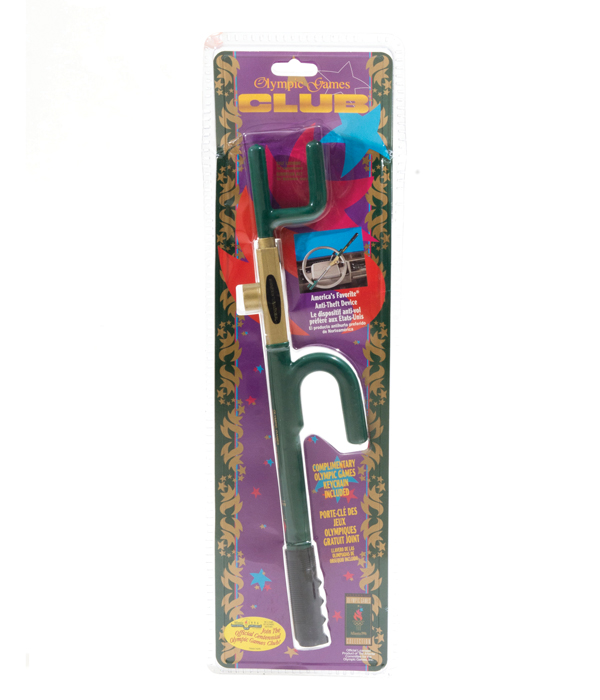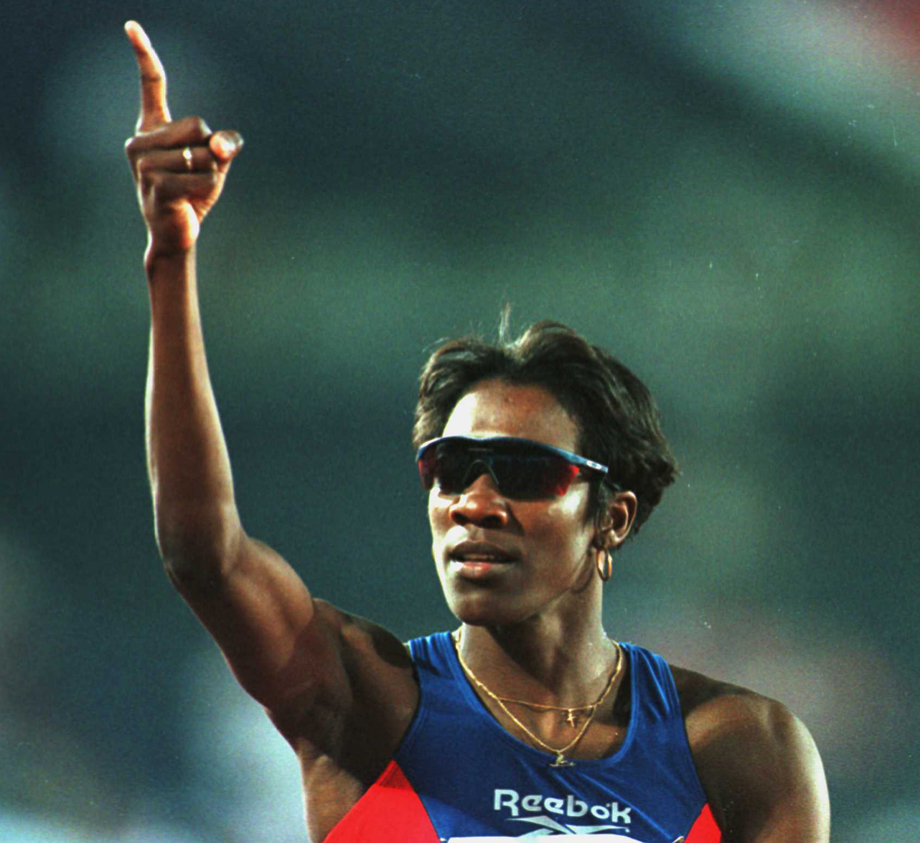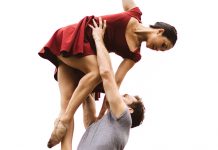
Photograph by David Taylor/Getty Images
Opening ceremony
“I performed with the ASO chorus. First we did the national anthem at one end of the stadium. The second it ended, half of us had to sprint—in polyester robes in Atlanta summer heat—to the other end and run up the stairs to the top, where we spread out along the rim and sang another song. Once that ended, we were supposed to sprint back to our original location. I always thought we deserved Olympic medals for choral athleticism!”
—Carol Wyatt, executive assistant at the Gail
Keeping the beat
“I was one of 100 drummers in the opening number of the Opening Ceremony, ‘A Call to the Nations.’ Kenny Ortega managed the event. The day of the ceremony, both Mickey [Hart, who cowrote the song] and Kenny joined us in a prayer circle before we went out on the field. I remember the moment before stepping out on the field, realizing that there may have been 86,000 present in the stadium, but many millions were watching around the world.”—Sherry Wheat, Atlanta

Photograph by Gary M. Prior/Getty Images
Photo finish
“Getting the gold medal in the 100 meters at the Barcelona Olympics in 1992 was my biggest achievement because just months earlier I had come back from Graves’ disease. I didn’t know if I’d be able to walk again, let alone run. Four years later I knew the race would be close. When my name came up as the winner, I was like, ‘Thank you, God.’ And thankful that I had a big head that helped me win at the line!”
—Gail Devers, gold medalist in the 100 meters and 100-meter relay, now an entrepreneur and mom in Buford

Photograph by Caroline C. Kilgore
Collect them all
“At Underground you could buy pins at the Olympic Experience store. One of my neighbors worked there, and one day she called me and said, ‘You better come down here. We just opened up a box of something. I’ve got a funny feeling they’re going to go fast.’ A box of these pewter Whatizit pins was there. [But] they were supposed to go to Billy Payne’s office. Numbered one of 96, two of 96. So she said, ‘Look, I can let you buy two of them because we want to spread them out. We don’t want anybody to buy them all and hoard them.’ I said, ‘Sure, great.’ Billy [Payne] never got them.”
—Bill Gornto, Olympic pin collector, owner of Twist ’n Scoot
Family bonding
“I had just graduated high school and had a real chip on my shoulder. My mom went to visit my sister in Colorado that summer, so it was just me and my dad at home. He worked for the Georgia Army National Guard and got passes to the Opening and Closing Ceremonies. Begrudgingly I agreed to go with him. But once I saw the torch lighting and realized what a moment in time I was witnessing, that wall I had put up crumbled. The bonding experience with my dad was something special he shared with me only. It was the beginning of a more adult father-daughter relationship that flourished until he died in 2004.”
—Leslieann O’Neal, Douglassville

Global relations
“The High assembled artworks from 29 different countries for the exhibition Rings: Five Passions in World Art. Couriers accompanied the loans and supervised installation of each object. We had such a wild variety of languages, personalities, and customs, but when it came to working in the galleries, we all understood each other and what needed to be done.”
—Frances Francis, senior registrar of the High Museum of Art
Picturesque
“My father and I went to the Opening Ceremony, and I vividly remember the excitement of finally seeing the completed stadium. I wasn’t very experienced with a camera, but my dad lent me his Yashica 35mm, and I documented what I could. Recently I visited Turner Field to get one more photo of the changes to the skyline—and to sit in the same seat as I did 20 years before beside my dad.”
—Dustin Grau, Duluth
The torch run
“When the Olympic torch run came through Atlanta, my mom and siblings drove up to watch. After one of the runners passed on the flame, he walked up to our car and said hello. He let me touch the torch and told me about where the run was going. My mom told me after the exchange that touching the torch would give me luck. It’s a moment that has always stuck with me.”
—Michele Baker, Atlanta

Fighting fear
During the Olympics, I worked at a recruiting firm. Everyone was caught up in the spirit of the Games, and I wanted to be involved, so I worked nights in a Swatch kiosk selling watches. I was in the park the night of the bombing. It was very festive, a lot of camaraderie. Afterwards there was fear in the back of your mind. I was 26 at the time. I had tickets to the track and field finals, really fantastic seats, and I went. At that age, I was not as afraid of things. Now? Oh no, I would’ve never gone back there.”
—Nancy Geery, from our 2011 oral history of the Olympic Park bombing

Photograph by Michael Cooper/Allsport via Getty Images
Guarding Ali
“For a week I was the only state trooper assigned to Muhammad Ali. When we got to the Olympic Stadium the afternoon [of the opening ceremony], I cracked my black Suburban’s window down, and there was that chant: Ali! Ali! Ali! I thought we were going to get mobbed.
My job was to stay with him until he lit the Olympic torch. With the Parkinson’s disease he had, I told [the officials], “I ain’t sure he can hold that [torch].” But they said, “Give him a shot.” I was about 10 feet away from him because, if something happened, I was on top of it to make sure it was lit. But he knew what he had to do. It was unbelievable. I worked so many details over 31 years. This Olympic detail with Muhammad Ali is tops. It’s history. My grandkids can someday go back and look at it.”
—Johnnie B. Hall, retired state trooper
Celebrity sighting
“My friend, a television executive, had some prime seats for all of the events and asked me if I wanted to attend any of them. My wife suggested I take my mom. But a couple of days before [the events], the bombing happened. I was sure that my mom wouldn’t go now. But when I called her, she said, ‘Nothing is going to stop us!’ So off we went to women’s basketball, diving, and track and field, where we sat in front of Bob Dole, who was running for president.”—Eugene White, Mountain Park

Photograph by Jed Jacobsohn/Staff via Getty Images
A birthday to remember
“I was elected to read the athlete’s oath at the Opening Ceremony, which happened to be on my birthday. I spent that morning with President Clinton, following him and his family around Atlanta. Bill was really cool. I just tried to keep up with him and not get in the Secret Service’s way. That night I remember Muhammad Ali entering the stadium. The thrill, oh my God! Then I had to deliver my speech, so I had to get my composure back. I was so proud to represent my sport. Those Olympics were a game changer for women’s basketball and helped pave the way for the WNBA. We knew what was at stake.”
—Teresa Edwards, gold medalist in women’s basketball, now assistant coach for the Atlanta Dream

Photograph by AP Photo/Tannen Maury
MARTA’s big moment
“I signed up through AmeriCorps to be an Olympic Ambassador. Part of it included working security at the Olympic Village at Georgia Tech. I still have my pith helmet, which made it look like you’re going on a safari. Every day I’d head toward downtown. We kept getting the message: Take MARTA. Take MARTA. You would step on the platform. It was packed. The train would arrive. It was packed. Everyone felt like riding MARTA was part of our civic duty. I’ve never seen it busier.”
—Rebecca Serna, executive director of the Atlanta Bicycle Coalition
Before there was Uber
“I was a volunteer driver during the Games, [and] my motor pool site was near the Marriott Marquis, which was the official Olympic hotel. You never knew who you were going to get. I drove members of the Puerto Rican sports federation to Gainesville for rowing, the head of the anti-doping committee’s family to Stone Mountain for tennis, and a top official of the International Olympic Committee. I took two brothers who headed Tonga’s sports federation on a tour of the city and ordered them fried green tomatoes at lunch.”
—Harvey Newman, professor emeritus at Georgia State University
Open road
“I flew out of Hartsfield the morning after the opening ceremony. For months everyone had been told to stay off the roads. I’ve never sailed down the Connector as easily. At least in my memory, there may have been only one or two other cars on the entire stretch.”
—Kyle Kessler, architect and community program manager for the Center for Civic Innovation

Photograph by Doug Pensinger/Allsport via Getty Images
Winning gold
“During the gymnastics team finals, I remember walking into the Georgia Dome, with 40,000 screaming spectators. The applause was deafening, and there were flashbulbs going off like the Fourth of July. It was just a sea of red, white, and blue. I knew that night was going to be magical. Receiving that gold medal was amazing. There’s nothing like standing up there on the platform in your uniform and seeing the American flag being raised.”
—Shannon Miller, gold medalist in balance beam and team gymnastics, now an entrepreneur and childhood obesity advocate

Photograph courtesy of Noah Wuellner
Cutting the cord
“I worked for the Today show during the Olympics. One of the rare items at that time was a mobile telephone. NBC entrusted me with one, but it was the now relic ‘bag phone,’ which resembled a purse. Having to tote it through all the security checkpoints made me the focus of great ridicule by the security officers—that is until the bag was opened for further inspection, when a look of amazement swept over their faces. All the jeering was followed by 10 to 20 minutes of show and tell.”
—Noah Wuellner, Atlanta
A whole new ball game
“We drove from Norcross to the Chamblee MARTA station and rode downtown, where we got tickets off a guy in the street. They happened to be for the semifinal Ping-Pong match. My dad was definitely a fan. Growing up, he made my siblings and me learn how to play. Stereotypically China was in the match; I can’t remember the other team. The players were intense. They’re so good, so each round lasts forever; the match went for maybe a couple hours. Like any seventh grader, [I got] bored. I was like, ‘Dad, why do we have to watch Ping-Pong?’ In hindsight it was cool.”
—Amy Phuong, Atlanta parks and recreation commissioner
Fortunate friends
“Prior to the Olympics, I had a pen pal in the Maldives. I got a call a couple of days before to the start of the games from a coach on their team, who had a letter from my pen pal to deliver personally. I asked if there was anything I could do to help the team, and they asked if I could host two Maldivian teenagers who were traveling to attend an Olympic Youth Camp at Berry College. In exchange we asked if they could get us into the Olympic Village. We were able to make it in with Maldivian credentials and by luck met Muhammad Ali.”
—Ralph Parker, Marietta

Photograph by Matthew Stockman/ALLSPORT via Getty Images
Merchandise mania
“[ACOG] sold a lot of merchandise to privately fund [the Games], and we actually made money—which we gave back to the community—so I guess it did okay.”
—Billy Payne, head of the Atlanta Committee for the Olympic Games (ACOG)

Photograph by Caroline C. Kilgore
Product placement
“People would send bizarre ideas for products they wanted us to license. Someone sent a refrigerated container that held your lipstick, so it wouldn’t melt at the Games, since it was really hot in Atlanta. There was another container that held your cigarettes. It had a time lock that opened [only] every four hours to help you stop smoking. That didn’t make the cut. Remember the vuvuzelas in the World Cup? We had tons of those presented to us. We passed.”
—Robert Hollander, ACOG’s vice president of licensing, who was responsible for approving official merchandise
Home field advantage
“Everything was within a three-mile radius: my home in Midtown, the stadium, and Georgia Tech, where I went to school. It was incredible to be in the middle of the city as it was being built up. I would drive by the stadium while it was being constructed, and that was motivation, knowing that one day soon I could be running in front of 80,000 people. I saw it like I had a home field advantage. After I won, I didn’t know how to act. It was the first time in my life that I crossed the finish line and still felt nervous, like I couldn’t believe I was actually Olympic champion. You’re not supposed to feel nervous once you cross the line. The race is over.”
—Derrick Adkins, gold medalist in the 400-meter hurdles, now a motivational speaker in New York and Atlanta
Electricity in the air
Competing in front of such a large crowd in Barcelona [in 1992] was a great experience, but to swim in front of your home crowd was incredible. The energy in the Georgia Tech Aquatic Center was electric and something I will never forget.
—Joe Hudepohl, gold medalist in the 4X200 meter freestyle relay, now an investment portfolio manager in Atlanta

Photograph by Mike Powell/ALLSPORT via Getty Images
A single regret
“I’d gotten injured a little before the start of the Olympics, and I was a wreck. No one really knew except those in my circle. Because I was being so careful, I didn’t go to the opening ceremony. Later I really wished I’d gone. Even with winning silver and not gold,
I have no regrets except for that.”
—Kim Batten, Silver medalist in the 400-meter hurdles, now a graduate student and owner of a sports performance company in Atlanta

Photograph by Simon Bruty/Allsport via Getty Images
Performing for the Prez
“I’d just moved back from Asia and scored some pretty good gigs for the Olympics. Then I got a call from producer Horace Jones, who was in charge of a gala event at Symphony Hall on the day of the opening ceremony. The week prior I was asked for my ID and had to fill out some forms. It was one of the first gigs where I got searched. Our arts ensemble was a piece of a bigger production, so our time was short, less than three minutes. When we rose from orchestra pit, the first set of eyes I came upon was Bill Clinton and then Andy Young. I didn’t realize until I got home that I forgot my ID. It was a real special moment: You played for the president, you played the shortest gig of your life, and you didn’t get arrested without your ID.”
—Omar Phillips, tour drummer for Outkast

Photograph courtesy of Steve Denker
Game changer
“In 1993 I was graduating from Hofstra University and received a job offer from Aramark, which was involved in servicing the new Olympic Stadium. The opportunity to be part of the Games was overwhelming. (Also I had heard that the girl-to-guy ratio in Atlanta at the time was 16-1, and as a marketing analytics guy, those are odds you take.) That summer I watched as the stadium rose out of the ground. We had meetings to discuss progress updates, crowd logistics, security, event delay scenarios. But as the Games began, I realized that the flavor of the Atlanta Olympics wasn’t in the venues; it was outside in the Village and in the bars.”
—Steve Denker, Smyrna
Seizing opportunity
“While the athletes were parading around the perimeter of the field during the Opening Ceremony, the orchestra was taking a break, and a few of us slithered into the bowels of the stadium so not to miss a minute of the procession. We stood as close to the edge as we could to watch all the wonderful people go by. The athletes began to slow down to ask us to take their pictures, which we gladly did in return for a few Olympic pins and many grateful smiles and greetings. This was the highlight of the day until we were told to stop because we were slowing down the whole ceremony.”
—Ronda Respess, violinist with the Atlanta Symphony Orchestra
Meeting the stars
“I had been an Olympic fanatic since I was little, so when the games came to Atlanta, I knew I had to be a part of it. When hiring began, I went and told them that I didn’t care what I did, but it had to be in the Olympic Village. I ended up getting a job with Wolf Camera in the village, where I met Katie Couric, Al Roker, Maynard Jackson, Newt Gingrich, Muhammad Ali, and lots of athletes. I was even on TV when Al did the weather one day.”
—Kathy McDonough, Peachtree Corners
This article originally appeared in our July 2016 issue.










![The North Carolina Museum of Natural Sciences’ newest exhibit is a [pre]historic first](https://cdn2.atlantamagazine.com/wp-content/uploads/sites/4/2024/04/DD-3-100x70.jpg)


